

January 9 – 15: “Is it possible to fall in love again?”
 In the midst of struggling to finish a manuscript, writers often admit to loathing the story. This week, ITW Members Sarah K. Stephens, Angel Luis Colón, Alison Joseph, Alexandra Ivy, Jeff Soloway, Adrian Magson, AJ Davidson, Linda Lee Kane, Patricia Smiley, Thomas Perry, Mary Lawrence, A.J. Kerns, Dana King and Nichole Christoff discuss whether or not it’s possible to fall in love again? Or is the passion gone for good?
In the midst of struggling to finish a manuscript, writers often admit to loathing the story. This week, ITW Members Sarah K. Stephens, Angel Luis Colón, Alison Joseph, Alexandra Ivy, Jeff Soloway, Adrian Magson, AJ Davidson, Linda Lee Kane, Patricia Smiley, Thomas Perry, Mary Lawrence, A.J. Kerns, Dana King and Nichole Christoff discuss whether or not it’s possible to fall in love again? Or is the passion gone for good?
~~~~~
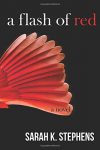 Sarah K. Stephens earned her doctorate in Developmental Psychology and teaches a variety of human development courses as a lecturer at Penn State University. Her courses examine a variety of topics, including the processes of risk and resilience in childhood, the influence of online media on social and behavioral development, and evidence-based interventions for individuals on the autism spectrum. Although Fall and Spring find her in the classroom, she remains a writer year-round. Her short stories have appeared in Five on the Fifth, The Voices Project, The Indianola Review, (parenthetical), eFiction, and the Manawaker Studio’s Flash Fiction Podcast. Her debut novel, A Flash of Red, was released in December 2016 by Pandamoon Publishing.
Sarah K. Stephens earned her doctorate in Developmental Psychology and teaches a variety of human development courses as a lecturer at Penn State University. Her courses examine a variety of topics, including the processes of risk and resilience in childhood, the influence of online media on social and behavioral development, and evidence-based interventions for individuals on the autism spectrum. Although Fall and Spring find her in the classroom, she remains a writer year-round. Her short stories have appeared in Five on the Fifth, The Voices Project, The Indianola Review, (parenthetical), eFiction, and the Manawaker Studio’s Flash Fiction Podcast. Her debut novel, A Flash of Red, was released in December 2016 by Pandamoon Publishing.
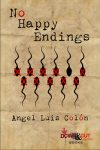 Angel Luis Colón is the author of The Fury of Blacky Jaguar,NO HAPPY ENDINGS, and the in-progress short story anthology Meat City on Fire (and Other Assorted Debacles). He’s an editor for the flash fiction site Shotgun Honey, has been nominated for the Derringer Award, and is published in multiple web and print pubs such as Thuglit, Literary Orphans, All Due Respect, The Life Sentence, RT Book Reviews, and The LA Review of Books. He’s also currently repped by Foundry Literary + Media. Keep up with him on Twitter via @GoshDarnMyLife.
Angel Luis Colón is the author of The Fury of Blacky Jaguar,NO HAPPY ENDINGS, and the in-progress short story anthology Meat City on Fire (and Other Assorted Debacles). He’s an editor for the flash fiction site Shotgun Honey, has been nominated for the Derringer Award, and is published in multiple web and print pubs such as Thuglit, Literary Orphans, All Due Respect, The Life Sentence, RT Book Reviews, and The LA Review of Books. He’s also currently repped by Foundry Literary + Media. Keep up with him on Twitter via @GoshDarnMyLife.
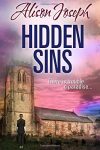 Alison Joseph is a London-based crime writer and award-winning radio dramatist. She is author of the series of novels featuring Sister Agnes, a contemporary detective nun, and also ‘Dying to Know,’ a crime novel abut particle physics featuring DI Berenice Killick. Her new series features a fictional Agatha Christie as a detective, published by Endeavour Press. Alison is a member of Killer Women, and was Chair of the British Crime Writers Association from 2013- 2015.
Alison Joseph is a London-based crime writer and award-winning radio dramatist. She is author of the series of novels featuring Sister Agnes, a contemporary detective nun, and also ‘Dying to Know,’ a crime novel abut particle physics featuring DI Berenice Killick. Her new series features a fictional Agatha Christie as a detective, published by Endeavour Press. Alison is a member of Killer Women, and was Chair of the British Crime Writers Association from 2013- 2015.
 Alexandra Ivy is a New York Times and USA Today bestselling author of the Guardians of Eternity, as well as the ARES Security series. After majoring in theatre she decided she prefers to bring her characters to life on paper rather than on stage. She lives in Missouri with her family.
Alexandra Ivy is a New York Times and USA Today bestselling author of the Guardians of Eternity, as well as the ARES Security series. After majoring in theatre she decided she prefers to bring her characters to life on paper rather than on stage. She lives in Missouri with her family.
 Formerly an editor and writer for Frommer’s travel guides, Jeff Soloway is now an executive editor in New York City. In 2014 he won the Robert L. Fish Memorial Award from the Mystery Writers of America. His Travel Writer mystery series is published by Alibi, Random House’s digital imprint for crime fiction. The second novel in the series, THE LAST DESCENT, which takes place in the Grand Canyon, just came out.
Formerly an editor and writer for Frommer’s travel guides, Jeff Soloway is now an executive editor in New York City. In 2014 he won the Robert L. Fish Memorial Award from the Mystery Writers of America. His Travel Writer mystery series is published by Alibi, Random House’s digital imprint for crime fiction. The second novel in the series, THE LAST DESCENT, which takes place in the Grand Canyon, just came out.
 Hailed by the Daily Mail as “a classic crime star in the making”, Adrian Magson is the author of 21 books, the latest of which is The Bid (Midnight Ink), published on January 8, 2017. This the second book in a new series featuring investigators Ruth Gonzales and Andy Vaslik, after The Locker—Jan 2016—”Magson takes the suburban thriller overseas and gives it a good twist. Readers ……will happily get lost in the nightmare presented here.” (Booklist Reviews). Adrian also writes the Marc Portman spy thriller series (Severn House), prompting one reviewer to comment: “the most explosive opening chapters I have read in a long time. Give this man a Bond film script to play with!” The next title is this series is Dark Asset (Severn House – spring 2017)
Hailed by the Daily Mail as “a classic crime star in the making”, Adrian Magson is the author of 21 books, the latest of which is The Bid (Midnight Ink), published on January 8, 2017. This the second book in a new series featuring investigators Ruth Gonzales and Andy Vaslik, after The Locker—Jan 2016—”Magson takes the suburban thriller overseas and gives it a good twist. Readers ……will happily get lost in the nightmare presented here.” (Booklist Reviews). Adrian also writes the Marc Portman spy thriller series (Severn House), prompting one reviewer to comment: “the most explosive opening chapters I have read in a long time. Give this man a Bond film script to play with!” The next title is this series is Dark Asset (Severn House – spring 2017)
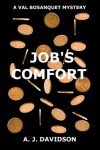 AJ Davidson is a traditionally published author and playwright, who, in Spring 2010, made the switch to Indie. He is keen to explore the potential of a rapidly changing publishing world, and is enjoying the closer contact with his readers that e-books afford. AJ has a degree in Social Anthropology. Married for 32 years, he has two children, a Harrier hound, and a cat called Dusty. Not one for staying long in the same place, AJ has lived in many countries across several continents. He has worked as a pea washer, crane-driver, restaurateur and scriptwriter. A member of the ITW. Represented by the Jonathan Williams Literary Agency.
AJ Davidson is a traditionally published author and playwright, who, in Spring 2010, made the switch to Indie. He is keen to explore the potential of a rapidly changing publishing world, and is enjoying the closer contact with his readers that e-books afford. AJ has a degree in Social Anthropology. Married for 32 years, he has two children, a Harrier hound, and a cat called Dusty. Not one for staying long in the same place, AJ has lived in many countries across several continents. He has worked as a pea washer, crane-driver, restaurateur and scriptwriter. A member of the ITW. Represented by the Jonathan Williams Literary Agency.
 Linda Lee Kane, MA in Education, PPS, School Psychologist, and Learning Disability Specialist, is the author of The Black Madonna, Witch Number is Which, Icelandia, Katterina Ballerina, Cowboy Jack and Buddy Save Santa, and Chilled to the Bones, 2017 release date, Clyde: Lost and Now Found, and Bottoms Up, A Daisy Murphy Mysteries. She lives with her husband and three dogs and six horses in California.
Linda Lee Kane, MA in Education, PPS, School Psychologist, and Learning Disability Specialist, is the author of The Black Madonna, Witch Number is Which, Icelandia, Katterina Ballerina, Cowboy Jack and Buddy Save Santa, and Chilled to the Bones, 2017 release date, Clyde: Lost and Now Found, and Bottoms Up, A Daisy Murphy Mysteries. She lives with her husband and three dogs and six horses in California.
 Patricia Smiley is the best-selling author of four mystery novels featuring amateur sleuth Tucker Sinclair. Pacific Homicide is the first of a new series about LAPD homicide detective Davie Richards and debuted on November 8, 2016. Patty’s short fiction has appeared in Ellery Queen Mystery Magazine and Two of the Deadliest, an anthology edited by Elizabeth George. She has taught writing at various conferences in the US and Canada. She served as Vice President for the Southern California chapter of Mystery Writers of America and as president of Sisters in Crime/Los Angeles.
Patricia Smiley is the best-selling author of four mystery novels featuring amateur sleuth Tucker Sinclair. Pacific Homicide is the first of a new series about LAPD homicide detective Davie Richards and debuted on November 8, 2016. Patty’s short fiction has appeared in Ellery Queen Mystery Magazine and Two of the Deadliest, an anthology edited by Elizabeth George. She has taught writing at various conferences in the US and Canada. She served as Vice President for the Southern California chapter of Mystery Writers of America and as president of Sisters in Crime/Los Angeles.
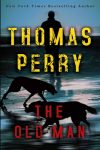 Thomas Perry is the bestselling author of over twenty novels, including the Edgar Award winner The Butcher’s, a String of Beads, Poison Flower, and Forty Thieves. His Metzger’s Dog was voted one of the best 100 thrillers ever by NPR listeners.
Thomas Perry is the bestselling author of over twenty novels, including the Edgar Award winner The Butcher’s, a String of Beads, Poison Flower, and Forty Thieves. His Metzger’s Dog was voted one of the best 100 thrillers ever by NPR listeners.
 Mary Lawrence lives in Maine and worked in the medical field for over twenty-five years before publishing her debut mystery, The Alchemist’s Daughter (Kensington, 2015). The book was named by Suspense Magazine as a “Best Book of 2015” in the historical mystery category. Her articles have appeared in several publications most notably Portland Monthly Magazine and the national news blog, The Daily Beast. Book 2 of the Bianca Goddard Mysteries, Death of an Alchemist, released in February 2016.
Mary Lawrence lives in Maine and worked in the medical field for over twenty-five years before publishing her debut mystery, The Alchemist’s Daughter (Kensington, 2015). The book was named by Suspense Magazine as a “Best Book of 2015” in the historical mystery category. Her articles have appeared in several publications most notably Portland Monthly Magazine and the national news blog, The Daily Beast. Book 2 of the Bianca Goddard Mysteries, Death of an Alchemist, released in February 2016.
 Nichole Christoff is a writer, broadcaster, and military spouse who owes Jane Austen, James Thurber, and Raymond Chandler for her taste in fiction. Nichole is also the award-winning author of The Kill List, The Kill Shot, and The Kill Box starring army brat and private-eye-turned-security-specialist, Jamie Sinclair. When she isn’t at her desk working on her latest novel, Nic is out in the woods with her ornery English Pointer.
Nichole Christoff is a writer, broadcaster, and military spouse who owes Jane Austen, James Thurber, and Raymond Chandler for her taste in fiction. Nichole is also the award-winning author of The Kill List, The Kill Shot, and The Kill Box starring army brat and private-eye-turned-security-specialist, Jamie Sinclair. When she isn’t at her desk working on her latest novel, Nic is out in the woods with her ornery English Pointer.
 Arthur Kerns is a retired FBI supervisory special agent and past president of the Arizona chapter of the Association of Former Intelligence Officers (AFIO). His award-winning short fiction has appeared in numerous anthologies. He is a book reviewer for the Washington Independent Review of Books. Diversion Books, Inc. NY, NY published his espionage thriller, The Riviera Contract, and the sequel, The African Contract. The third in the series, The Yemen Contract, was released in June 2016.
Arthur Kerns is a retired FBI supervisory special agent and past president of the Arizona chapter of the Association of Former Intelligence Officers (AFIO). His award-winning short fiction has appeared in numerous anthologies. He is a book reviewer for the Washington Independent Review of Books. Diversion Books, Inc. NY, NY published his espionage thriller, The Riviera Contract, and the sequel, The African Contract. The third in the series, The Yemen Contract, was released in June 2016.
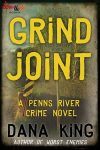 Dana King has two Shamus Award nominations, for A Small Sacrifice and The Man in the Window. His Penns River series of police procedurals includes Worst Enemies and Grind Joint, which Woody Haut, writing for the L.A. Review of Books, cited as one of the fifteen best noir reads of 2013. Down and Out Books will release the next book in the Penns River series, Resurrection Mall, in May 2017.
Dana King has two Shamus Award nominations, for A Small Sacrifice and The Man in the Window. His Penns River series of police procedurals includes Worst Enemies and Grind Joint, which Woody Haut, writing for the L.A. Review of Books, cited as one of the fifteen best noir reads of 2013. Down and Out Books will release the next book in the Penns River series, Resurrection Mall, in May 2017.
- LAST GIRL MISSING with K.L. Murphy - July 25, 2024
- CHILD OF DUST with Yigal Zur - July 25, 2024
- THE RAVENWOOD CONSPIRACY with Michael Siverling - July 19, 2024
